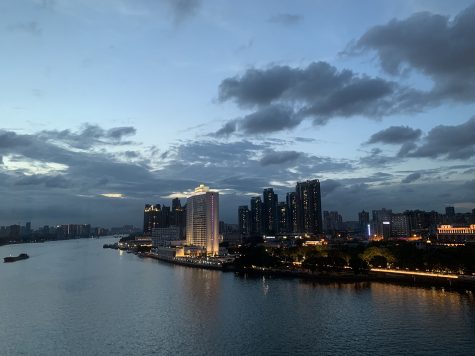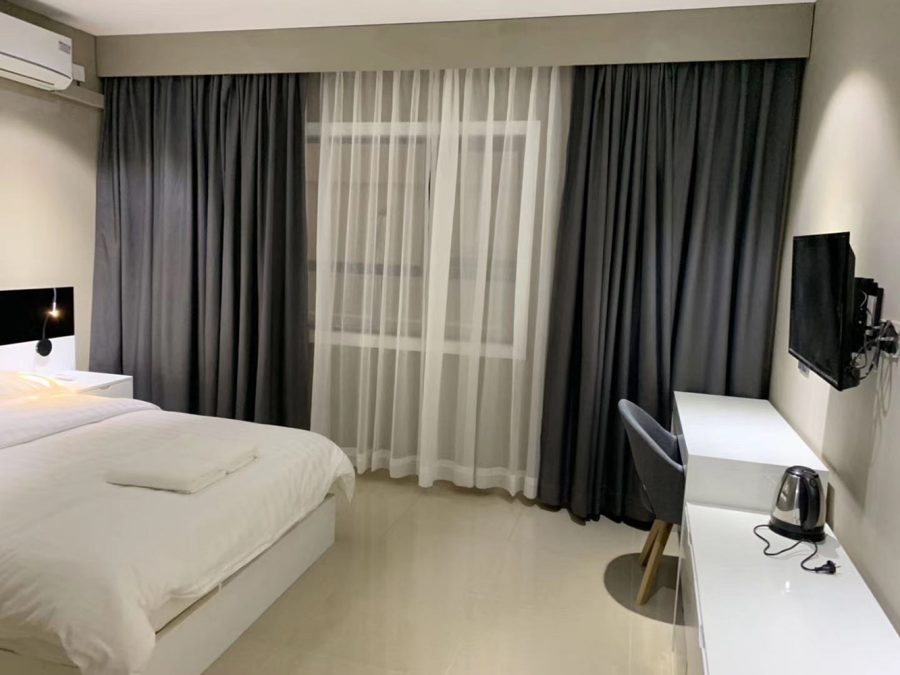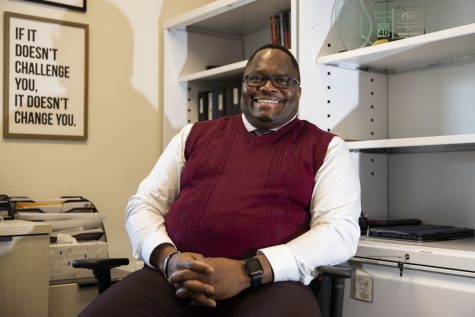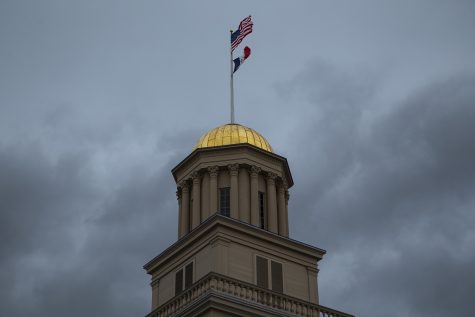Hassles heading home: University of Iowa international students recount memories of quarantine centers
Three international students at the University of Iowa share the challenges and barriers COVID-19 added to making the journey home for holidays and breaks.
December 15, 2020
As winter break approaches, many University of Iowa international students are encountering barriers to make their journeys home, including travel restrictions, inflated airfare, and government-mandated quarantining at regulated centers when they return.
Ran Huo, a third-year Ph.D. student in the UI College of Pharmacy from Zhengzhou, China, said she first traveled back to China in March because she needed to get home for a family emergency.
Because of COVID-19 mitigation efforts in China, Huo said she was sent to a hotel to quarantine alone in one room for 14 days instead of returning home immediately upon her arrival.
Once there, Huo said she was not allowed to leave the room at all, but was able to leave her trash outside her door. She received meals three times a day, COVID-19 tests twice a day, and had a blood test done after seven days, she said.
“Just study and sleep,” Huo said. “… Just study and sleep, that’s all I did.”
Huo said she did alert security and officials about her family emergency and that she needed to get home as soon as possible. Officials told her there was no possibility that she could be released any earlier.
Feelings of isolation and loneliness crept in, Huo said, but she could tolerate it by finding things to do.
While the strictness of the quarantine center did not come as a surprise to Huo — she was familiar with how the Chinese government operates — she said she had to hide where she traveled from when she was released after the 14 days.
“So, I can’t tell anyone that I came here from the U.S. because it’s very sensitive,” Huo said. “I even got some discrimination because even when you get all the tests negative, they still think you are dangerous. They still think they might get infected by me, so I won’t tell anyone that I come from the U.S.”
After she was released to the quarantine center, Huo said she had to quarantine for seven days. The government even stuck a note on her door alerting her neighbors that she was returning from the U.S.
Huo said she did tell someone she had returned from the U.S., and they started to treat her differently, isolating her, and demanding to see her test results and documents.
Though her relatives did not agree with her, Huo decided to come back to the U.S. in September to continue her studies, and this time she had to face another obstacle.
The U.S. imposed a travel restriction banning people from China from coming to the U.S. without quarantining in a third country for two weeks before entering.
Huo said she chose Cambodia, which is a popular option for Chinese international students because it’s relatively safe and cheap.
Huo said she does not expect to return home until 2022 because she is behind on her work after traveling home to be with family, on top of the long and grueling process of international travel.
RELATED: University of Iowa sees drop in international student enrollment
UI junior Danxuan Chen, who is from Shandong, China, said she decided to return home from the U.S. in early August when cases were rising and a roommate of hers frequently left and returned to the apartment.
The journey she made with her other roommate, who was also from China, required a rental car and multiple flights, Chen said, and they eventually made it to China for her 14-day quarantine.

Like Huo, Chen stayed in a hotel room by herself and was given meals and Wi-Fi, and had her temperature checked daily.
“We could not go outside the door,” Chen said. “… I [had to] take the final of the summer courses in the hotel. It’s so hard.”
Chen said she used the time to finish her summer courses and talk with her friend who was also quarantining in the same hotel.
While Chen said she doesn’t regret her decision to return to China because of the third-country travel requirements, she doesn’t know when she’ll be able to return to the U.S.
UI junior Mishma Nixon, who is from Sri Lanka, said she also had a mandatory quarantine upon her return home. However, her experience was much different and lasted nearly a month.
Desperate to return home since the pandemic began in March, Nixon said she was finally able to communicate with her embassy and secure a flight home after leaving the dorms and having apartment hopped in Iowa City for a few months.
The flight, which was more expensive than normal, took her from Chicago to Dubai and then to Colombo, Sri Lanka’s capital.
Though the airport is just 20 minutes from her home, Nixon said she had to ride five hours in a bus to a rural area in the Northwest part of Sri Lanka.
She said she had the option to pay money and stay in a hotel, but chose to stay in a government-regulated quarantine center for no extra fee.
The place where Nixon ended up for 14 days was a military compound called “Big Forest,” when translated into English, she said.
There were a lot of undergraduate students, Nixon said, and everyone else was like “aunties.”
To ward off boredom, Nixon said different units would prank call each other, fight for Wi-Fi, and for one woman’s birthday, they convinced her husband to order a cake to the center.
It wasn’t all pleasant, Nixon said. At one point, her bed became infested with ants, and insects crawled around the center, she said, which didn’t have air conditioning and became extremely hot during the daytime.
Additionally, when Nixon arrived at the center, she discovered that her laptop was broken and that the screen had cracked while airport workers were handling her luggage. The only access to the outside world was her cell phone.
Nixon said she found out during her quarantine about the ICE international student ban in the U.S., a later rescinded order that would’ve restricted international students from staying in the U.S. if their university’s classes went all online.
“All of the students in the quarantine center were panicking,” Nixon said. “And it was just like a frenzy.”
Bewildered, Nixon said she was able to do some advocacy work for the International Student Advisory Board in communicating with UI administrators and students from the center, but she was limited by the technological barriers.
The night before Nixon was scheduled to go home, she said she prayed everyone would test negative, or they would all have to start the process over again. Luckily, her wish came true, and Nixon said she was dropped off at her local police station the following day.
Now, Nixon said she’s hoping to return to the U.S. during the second semester, because taking online classes from her house, which is 11 and a half hours ahead of central U.S. time, has become daunting. She noted that if she does return, she likely will not make plans to go to Sri Lanka any time soon, because the experience was daunting.
“I only traveled and came back home because I was literally desperate to be home,” Nixon said. “I was feeling very lost, and I had to come home. But I don’t think I would travel again if I’m not feeling that way … I wouldn’t put myself through that again any time soon.”




















